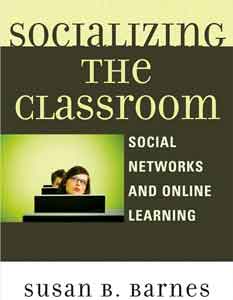
[The Montana Professor 23.2, Spring 2013 <http://mtprof.msun.edu>]
Susan B. Barnes
Lanham, MD: Lexington Books, 2012
228 pp., $60.00 hc
Mary Anne Hansen
Professor of Library Science
MSU-Bozeman

In Socializing the Classroom: Social Networks and Online Learning, Susan B. Barnes and her team of scholars at the Rochester Institute of Technology's Lab for Social Computing provide a theoretical and research-based context for utilizing the social media model in the academic setting. Barnes and her research team are not necessarily advocating the integration of social media into all formal learning environments, but they do argue that integrating what we know about the formation of online communities among digital natives into course management systems can help provide a context and conduit for student learning. Barnes's team has found that students may relate and even compare formal online learning environments to their social media experiences through such platforms as Facebook and Twitter, but students may not necessarily want these types of social media applications in their educational space. They cite research which suggests that today's students learn differently by virtue of growing up with the internet pervading so much of their lives, especially their social lives. Thus the virtual social experiences which students bring to the educational setting impact their expectations for their formal learning experiences.
Students expect course management systems to look and function more like the social media applications that they're accustomed to. However, students do not automatically form learning communities in online courses as easily as they may form social communities in various social media platforms. It is the instructor's responsibility to create opportunities for students to connect in online courses by structuring assignments and discussions, even assigning groups among students to facilitate the formation of learning communities within the course. The authors place the importance of forming online learning communities in the context of constructivist learning theory, a learner-centered model which encourages instructors to provide opportunities for learning in which students can create meaning for themselves out of the educational content. This work provides an extensive foundation for understanding the evolution of social networking and its potential usefulness for helping instructors both understand where students are and also be where students are in the online environment.
[The Montana Professor 23.2, Spring 2013 <http://mtprof.msun.edu>]